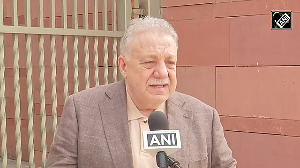There are many who feel Sourav Ganguly should not be playing the second Test against South Africa.
The India skipper was handed a two-match ban by match referee Clive Lloyd when his team exceeded the stipulated time limit by almost an hour during the Board of Control for Cricket in India's diamond jubilee celebration match against Pakistan at the Eden Gardens in Kolkata recently.
| |||||||||||
After considering oral evidence from Ganguly and Lloyd, as well as the grounds of the appeal, match paperwork and a video of the match, Castle overturned the ban.
'I allow this appeal and I quash the two-Test match ban imposed on Mr Ganguly,' said Castle in his judgment.
'On any analysis, the delay of nearly an hour to the finish of a 50-over ODI game beyond its scheduled finish time, is out of an acceptable range.
'I am of the opinion that the circumstances were particularly unusual in this game and a large number of them conspired to cause the delays which occurred.'
The most telling declaration was the last sentence of the press statement announcing Castle's decision. It said the decision of the Appeals Commissioner is final and binding. That said, it is where the issue should have ended.
 But it did not. First, former Australia skipper Steve Waugh claimed he was surprised by the decision.
But it did not. First, former Australia skipper Steve Waugh claimed he was surprised by the decision.
'I thought they will make an example,' he said.
Then, former England skipper Michael Atherton launched a scathing attack on the ICC, claiming that Lloyd had rightly banned Ganguly for two Tests following his breach of the rules.
Referring to Castle's overruling of the ban, Atherton wondered if that meant that the match referee was "asleep" during the match. The former England skipper, who writes a column for The Sunday Telegraph, also mentioned that ICC chief executive Malcolm Speed's hailing of the decision was absolute crap.
Every person is entitled to an opinion, but what exactly is Atherton trying to say? Is he trying to say that the ICC has no teeth and it did not have the conviction to stand by its decision in the face of intense pressure from the BCCI? Or is he just making a point against India's growing power in the world of cricket politics?
Another interesting thing happened immediately after Ganguly announced that he was going to appeal against the Lloyd's decision. The former West Indies skipper immediately went to the media and declared that Ganguly feels he is above the laws of cricket.
A reader sent us the full text of Lloyd's comments as it appeared in the Stabroek News, a newspaper in Guyana. An excerpt:
'It's obvious that this guy feels he is above the laws of cricket, but we have rules. Discipline is very important in the game.
'The captain is responsible for his team and their performance on the field -- if you are out there and your player misbehaves, you are responsible.'
It is obvious from this statement that Lloyd does not like Ganguly much. Henceforth, will this Indian team feel comfortable playing a match with Lloyd as match referee, keeping in mind his opinion of the Indian skipper?
Lloyd may have been trying to justify his decision, but why did he need to? Did he realize later that he had made a mistake?
The point to note here is that rules can be interpreted in many ways; no two people can have exactly the same opinion.
Secondly, in the abovementioned report, Lloyd had also gone on to explain exactly what went wrong during the match.
'India had 210 minutes to bowl their allotted 50 overs. At the end of the cut-off time, India had bowled 40 overs, so they got 24 minutes extra. But in that time they bowled only five more overs.'
This, according to Lloyd, 'should not have happened and Ganguly as head of the side should be held responsible'.
Match-referees are not allowed to speak to the media. Every time I try to speak to them, even about their cricketing past, I am told that the ICC does not permit them to give interviews. Thus, isn't revealing the details of Ganguly's wrongdoing totally unacceptable? Is it allowed by the ICC?
As we all know, worse offences have been viewed leniently by easygoing match referees. There are several instances of Australian and English players crossing the line but escaping censure.
The ban handed out to Ganguly is not the problem, but the inconsistency in the interpretation of the rules.
The ICC needs to lay down the law and make sure it is followed by all and sundry. Until that happens, match referees will continue to make the game their own private reserve.





